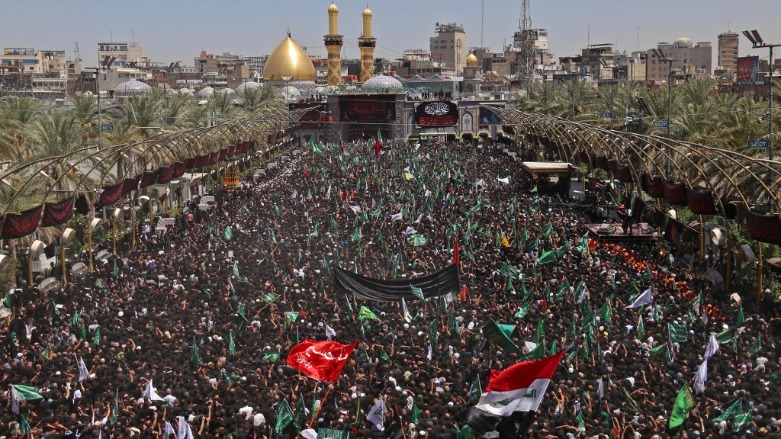Few Covid masks as millions throng Iraq shrine
Iraq is currently registering about 10,000 new coronavirus cases a day from its population of around 40 million.

Karbala, Iraq (AFP) – Masks were almost nowhere to be seen Thursday as millions of pilgrims thronged the Iraqi shrine city of Karbala for the Shiite commemoration of Ashura, ignoring Covid fears.
Six million pilgrims marked Ashura this year, the official Iraqi news agency reported, quoting authorities in Karbala.
They came from across the country but also from neighbouring Iran and from Pakistan, despite concerns over the pandemic.
Iraqi pilgrim Ali al-Assadi said faith in God was stronger than fear that such a large gathering could spark the spread of the virus.
"Despite the emergency situation facing Iraq due to the coronavirus pandemic, the people's faith in Imam Hussein means they are not afraid," he said.
Ashura commemorates a defining moment in the birth of the Shiite branch of Islam that is the majority faith in both Iraq and Iran.
It marks the killing of the Prophet Mohammed's grandson, Imam Hussein, by troops of Caliph Yazid in 680 AD in the Karbala desert.

Pilgrims traditionally walk to Karbala, sleeping in roadside camps set up along the way, in summer temperatures that regularly top 45 degrees Celsius (113 degrees Fahrenheit).
In the run-up to Ashura, mourning rituals are also held in Shiite cities and neighbourhoods across Iraq.
In Karbala, the most zealous flagellated themselves with flails or blades until their heads and backs were raw and streaming with blood, a practice frowned on by Shiite spiritual leaders.
- Divine providence -
For the faithful, religious devotion far outweighs any concerns about Covid-19 infection, despite warnings from authorities and the World Health Organization.
"We have warned the (Iraqi) ministry of health against any kind of religious tourism," said Ahmed Zouiten, the WHO's representative for Iraq.
He told AFP the UN agency was "more concerned about Arbaeen", one of the world's largest religious gatherings -- due to take place in September -- when millions of Shiites from around the world descend on Karbala.
Even though only a little over five percent of Iraqis have been fully vaccinated against Covid-19, pilgrims questioned by AFP brushed aside concerns.
"We're not bothering with masks, because our faith in Imam Hussein protects us from everything," said an unmasked pilgrim, who gave his name only as Dholam.
Kamel Mohammed, who likewise wore no face covering, added: "I have great faith in God."

Huge crowds of pilgrims began gathering around Imam Hussein's golden-domed mausoleum in the heart of the city from Wednesday evening.
Drummers banged out a rhythm as the faithful chanted prayers and poems commemorating Hussein's martyrdom.
- Super-spreader? -
Before the pandemic, the main Shiite pilgrimages in Iraq were among the largest religious gatherings in the world, and there have been concerns they could act as super-spreader events.
Indian health officials have said that the Hindu pilgrimage of Kumbh Mela, an event held every three years that drew millions to the Himalayan city of Haridwar in January, may have helped fuel a surge in infections earlier this year.
Iraq is currently registering about 10,000 new coronavirus cases a day from its population of around 40 million.
Recorded Covid-19 deaths since the start of the pandemic number a little under 20,000, according to health ministry figures.

The assistant director of the Imam Hussein mausoleum, Afzal Shami, insisted steps had been taken to avoid a major outbreak among pilgrims.
"Masks have been provided for visitors and anyone else who needs them for hygiene purposes," Shami said.
"Mobile teams have been deployed around the holy places to keep them sterilised and reduce the risks."
Disinfectant dispensers had been installed at the entrances to the shrine, lit up in red to draw attention. But there weren't nearly enough of them for the vast crowds camped outside.
"It's down to individual citizens to protect themselves by adopting preventive measures," Shami said.
Even before the pandemic began early last year, security was tight for the Shiite pilgrimages for fear of attack by Sunni extremists inspired by Al-Qaeda or the Islamic state group, which regard Shiites as heretics.
Roadblocks were again set up this year on all roads into Karbala, and access to the city was closed off completely from Wednesday.
Abbas, a pilgrim in his 60s, who spent Wednesday night inside the mausoleum, said it was the price of religious duty.
"This night comes but once a year," Abbas said. "You have to make sacrifices to perform the rituals."